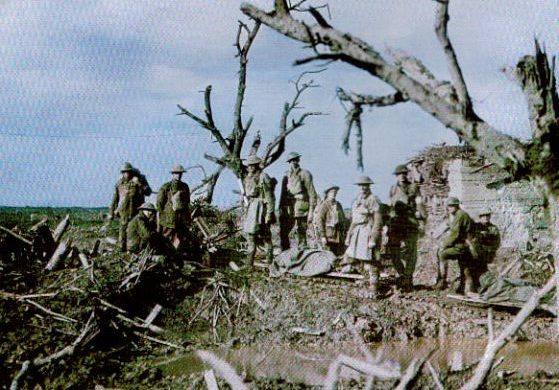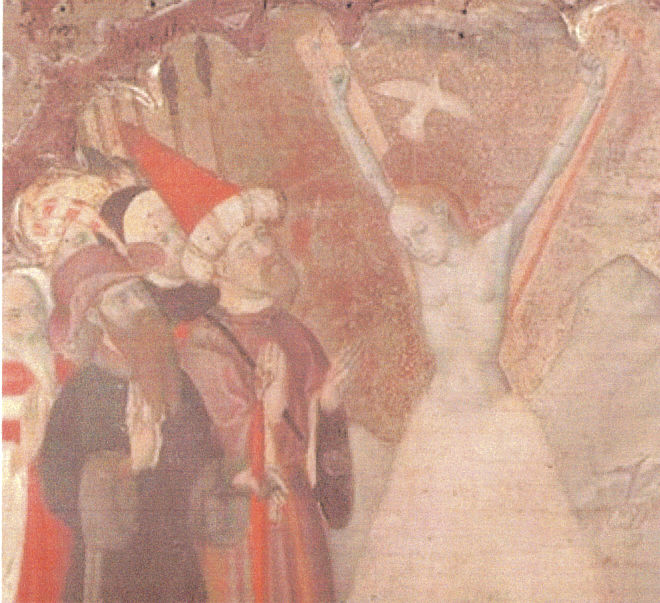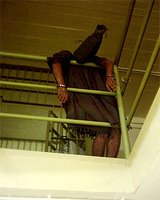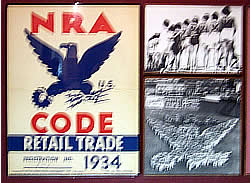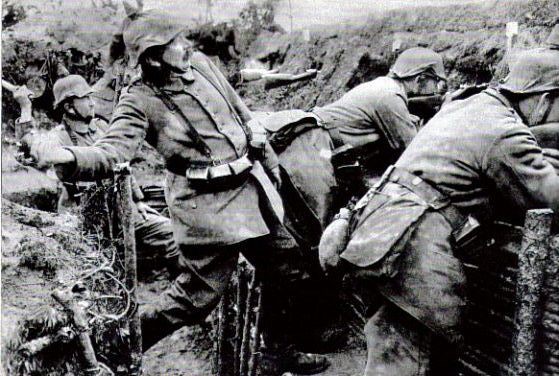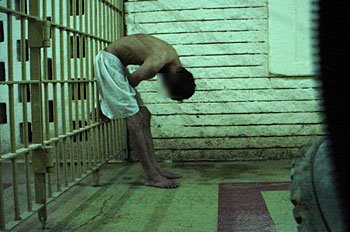I've changed the name of this Weblog from simply "Old Hickory's Weblog" to "Old Hickory's Weblog/Kurt Schumacher Weblog".
 Kurt Schumacher, 1895-1952
Kurt Schumacher, 1895-1952
The change is to recognize - "honor" would definitely not be the right word - the action of the Senate on Thursday, 09/28/06, when they approved the Torture Legalization Act of 2006. The House of Representatives had previously approved it. It now goes to President Bush, who will surely sign it into law.
Molly Ivins ended her most recent commentary on the Torture Legalization bill (Beyond the pale WorkingforChange.com 09/28/06) with this comment:
Fellow citizens, this bill throws out legal and moral restraints as the president deems it necessary - these are fundamental principles of basic decency, as well as law.
I'd like those supporting this evil bill to spare me one affliction: Do not, please, pretend to be shocked by the consequences of this legislation. And do not pretend to be shocked when the world begins comparing us to the Nazis.
This made me think about the title of this blog. Not that Andrew "Old Hickory" Jackson was anything remotely like disgraceful characters such as Dick Cheney, George Bush, or Rummy. They should count it a miracle that he hasn't risen from his grave in Nashville and come after them.
But the reason I chose a blog name in honor of Jackson was that in his time, he was the greatest symbol of democracy and he broadened democratic rights and participation in real ways. He also fought for the interests of working people, farmers and ordinary businesspeople against the misused power of concentrated wealth. Like Thomas Jefferson before him, Jackson was fighting primarily for the interests of free, white working people. But the point is not that he was some kind of secular saint. It's that, like Jefferson, he strengthened democracy and expanded the possibilities of freedom for ordinary people.
Nothing that the Cheney-Bush administration or this disgraceful Republican Congress do changes any of that, ofcourse.
But as long as this atrocious torture law is on the books, and as long as the actual practices of torturing prisoners that Cheney and Bush initiated as early as 2001 continues, it somehow doesn't seem reasonable to use a purely American symbol to convey the idea of Jacksonian democracy.
So I've added a 20th century Jacksonian to the blog title: Kurt Schumacher, leader of the German Social Democratic Party from 1946 until his death in 1952, one the most important democratic leaders in postwar Germany. Konrad Adenauer would have been a possibility. But Adenauer, even though he was very much a democrat, was also a stodgy conservative and political partisan of Big Capital. Certainly not a Jacksonian, despite his other virtues.
Schumacher is not a familiar name to Americans, so describing him takes a bit of background. Schumacher was a leader in the Socialdemorakitsche Partei Deutschlands (SPD), the German Social Democratic Party, prior to the Second World War. Born in 1895, he volunteered for service during the First World War. In the 1920s, he edited a social-democratic paper and served in the state parliament of Württemberg. He was an SPD member of the national Parliament, the Reichstag, from 1930-1933.
After Hitler became Chancellor and took dictatorial powers - a majority in Parliament voted to give Hitler such powers, a point we should not forget these days - the SPD was banned and Schumacher spent most of the years of the Third Reich in concentration camps, including Dachau. The camps were set up in 1933 and in the early years were used primarily to imprison social-democratic and communist activists.
After the war, Germany was divided into four zones, each controlled by one of the four United Nations major partners: the US, the USSR, Britain and France. In the Soviet zone, the Russians required that the SPD, whose national leadership was in their zone, to merge with the KPD (German Communist Party) into the Sozialistische Einheits Partei (SED), the Socialist Unity Party. The SED was always dominated by the Communists, but technically (or theoretically) it was a united socialist party. It ruled in East Germany as the SED until 1990.

SPD campaign literature: "With the SPD for a free, social, and united Germany" - the prewar borders of Germany are shown
Schumacher came to Berlin to work with the British officials to re-establish the SPD. A charismatic speaker and a forceful personality, he had lost an arm and part of a leg due to mistreatment and medical neglect he suffered in the camps.
He was definitely very much opposed to the merger of the SPD with the KPD, but was unable to prevent it. So he "refounded" the SPD in the western zones and became the party chairman. When the West German Federal Republic (BRD: Bundesrepublik Deutschland) was established in 1949, Schumacher went to Parliament as the head of the SPD "fraction" (party caucus) and led the SPD as the main opposition party until he passed away 1952.
His significance is the history of German democracy, broadly speaking, is that he established the SPD as a strong, independent democratic party in West Germany. He prevented the party from being dominated or destroyed by the forced unification imposed in the Soviet zone. And he established the practice of the SPD acting as a vigorous loyal opposition in the new German democracy.
Schumacher was a staunch advocate of German unification and an opponent of the SED (effectively Communist), Soviet-dominated government in East Germany and also a foe of the Soviet occupation. The German Microsoft Encarta 2007 gives this brief description of him:
Nach dem 2. Weltkrieg war Kurt Schumacher führend an der Neuorganisation der SPD in den drei Westzonen beteiligt. 1946 wurde er Vorsitzender der SPD, und 1948/49 wirkte er als Mitglied des Parlamentarischen Rates an der Ausarbeitung des Grundgesetzes mit. Als Gegner der Westintegration der Bundesrepublik lehnte Schumacher die Politik Konrad Adenauers als zu einseitig ab. Im Rahmen einer Kundgebung in Berlin am 1. November 1947 erläuterte Kurt Schumacher das Verhältnis der SPD zum Kommunismus: Der Kommunismus in seiner real existierenden Form sei zum „Prinzip des Expansionsdrangs eines Nationalstaates” verkommen und werde als solcher von der deutschen Sozialdemokratie strikt abgelehnt.
[After the Second World War, Kurt Schumacher was a leading participant in the new organization of the SPD in the three western zones. In1946,he became the Chairman of the SPD, and in 1948-49, he participated as a member of the Parliamentary Council on the development of the Basic Law [the West German Constitution]. As an opponent of the western integration of the Federal Republic [West Germany],he rejected the policy of Konrad Adenauer as too one-sided. In the setting of a rally in Berlin on November 1, 1947, Kurt Schumacher explained the position of the SPD toward Communism: Communism in its real existing form has degenerated into the "principle of the expansionist pressure of a national state", he said, and as such would be strictly rejeted by the German Social Democracy.]
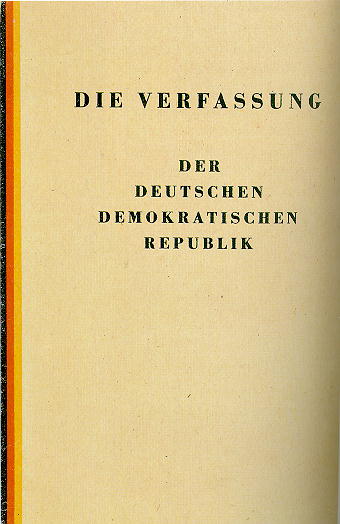
"The Constitution of the Democratic Republic of the German Democratic Republic": the East German Constitution - not the one Schumacher worked on
As that description indicates, Schumacher's commitment to parliamentary democracy and opposition to Communism in Eastern Germany did not translate into enthusiasm for the Western Allies. He even got formally suspended from his parliamentary seat for a few weeks once because he made a grumpy crack after a pro-Western speech by Adenauer that Andenauer was "the Chancellor of the Allies".
The SPD's attitude toward western alliances was very much bound up with the high priority they put on unifying Germany into a democratic state. They believed that Adenauer's Christian Democractic Union (CDU) was too willing to concede the long-term division of Germany. They even argued that Adenauer and the CDU were too willing to accept the Oder-Neisse line as the border between East Germany and Poland. The Oder-Neisse line placed a large portion of the prewar Germany, including East Prussia, into Poland.
Golo Mann in Deutsche Geschichte des 19. und 20. Jahrhunderts (1958) described Schumacher as "very German, very Prussian in the tradition of [August] Bebel, patriot and democrat, without doubt seeing the continuing existence of the "Reich", nation, state, socialism in a self-evident unity." That is to say, in the tradition of the rebels of 1848 and the Social Democrats of the 19th century, Schumacher viewed German patriotism, democracy andsocial-democracy as complementary andnecessary to each other.
He took his role as opposition leader seriously. Mann may have been a bit satirical when he referred to Schumacher "Jacobin spirit". But he definitely had a Jacksonian perspective in many ways. In this speech, Rede von Kurt Schumacher vor dem Deutschen Budestag 21.09.1946 (scroll down; 44 sec.) he reminded that that despitethe silly attitudes of the "Obrigkeiten" (authorities), the SPD intended to keep on being a vigorous opposition voice.
On one occasion, Schumacher declared that Adenauer with his Christian Democratic conservatism also had "a very reserved relationship to truth and honor".
In this speech, Rede von Kurt Schumacher vor dem Deutschen Budestag zu einem deutschen Verteidigungsbeitrag 08.11.1950 (scroll down: 6 min, 13 sec.), he describes his attitude toward militarism.
This brief film shows footage of Schumacher in action: Dokumentation über Kurt Schumacher und die parliamentarische Demokratie (25.09.2006) Erhard Eppler, in a current essay at the SPD Web site, Gefährliche Vision 25.09.06, provides an example of how Schumacher's vision defined the postwar perspective of the SPD:
In unseren Medien wird häufig beklagt, dass in Deutschland niemand mehr Visionen habe. Das stimmt und das hat seine Gründe. In Amerika ist das anders. Nur sind die Visionen dort nicht die unseren. Präsident Bush beschwört fast jeden Tag seine Visionen vom friedlichen, demokratischen, vom amerikanischen Beispiel beflügelten Nahen Osten, auch wenn seine Art, diese Visionen zu verwirklichen, im Gewaltchaos Irak zu enden scheint. ...
Der demokratische Rechts- und Sozialstaat war die Alternative zur Kommunistischen Volksdemokratie. Und hat gewonnen. Er ist auch die Alternative zum Marktstaat. Und wird gewinnen, zumindest in Europa. Im demokratischen Rechts- und Sozialstaat darf alles dem Markt überlassen werden, was zu Ware taugt. Für Autos oder Kühlschränke gilt Angebot und Nachfrage.
[People often complain in our media that in Germany no one has visions any more. That's true and there are reasons for that. In America, it is different. Only the visions there are not ours. President Bush almost every day conjuresup his visionsof a peaceful, democratic Near [Middle] East inspired by the example of America, even when his way of bringing these visions into reality seems to end in the violent chaos of Iraq.]
Eppler then discusses something that is virtually incomprehensible to American conservatives, the fact that in Germany, "Keine Partei hat den Marktstaat im Programm." The best way to translate that into American terms would be, "No party has free-market economics in its program."
It was the conservative party, Adenauer's Christian Democrats, that established the notion of the "social market economy" (Soziale Marktwirtschaft), in which the government providessupport for business and what in America we call a social safety net. It was Adenauer's Finance Minister (and later Chancellor) Ludwig Erhard whose developed what became known as the "social market economy" policy. (Erhard developed the policy; it was Alfred Müller-Armack who came up with the name.)
Let me repeat, though a hundred repetitions won't make it sink in for most American conservatives, the Soziale Marktwirtschaft was the program of German conservatives, not of the social-democrats.
The second paragraph of the Eppler quote reads:
[The democratic rule of law and social state was the alternative to the Communist People's Democracy [the name used for the form of government in the Eastern bloc states]. And it won. It is the alternative to free-market economic. And it will win, at least in Europe. In the democratic rule of law and social state, everything can be left to the market that has to do with goods. For cares or refrigerators, supply and demand applies.]
But, he continues, education is not a product, it's a human right. Every person has the right to personal security; that's why the government has a "monopoly of force". (A state "monopoly of force", by the way, is a basic concept of sovereignty, meaning that only the government has the right to use violence to enforce order. You see American officials sometimes talking about the need to establish a state monopoly of force in Iraq, i.e., to overrule the power of private militias.)
And, he writes, "Ärztliche Hilfe bei Krankheit ist ein Bürgerrecht, auch für Menschen, die sie nicht bezahlen können." [Medical care during sickness is a civil right, even for people who can't pay.]
Good Jacksonian-democratic ideas. Ideas verymuch in thetradition of Kurt Schumacher, as well.
 Kurt Schumacher, 1895-1952
Kurt Schumacher, 1895-1952

